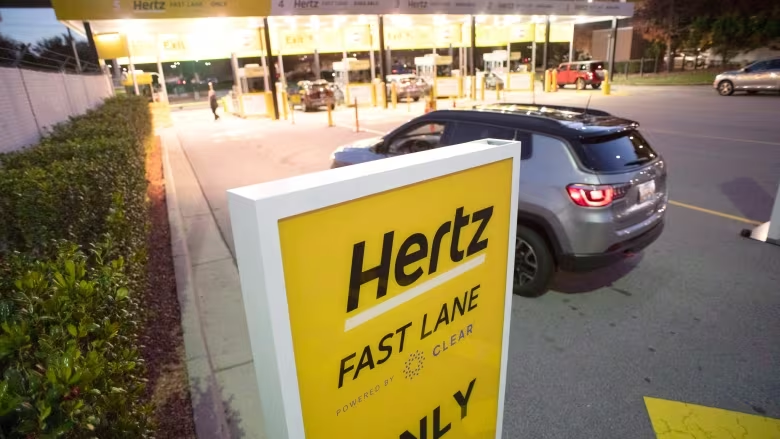
Vehicle rental giant Hertz says increased repair costs are part of why it's moving away from some of its electric vehicle fleet. (John Amis/AP Images for Hertz Fast Lane powered by CLEAR)
On Thursday, Hertz Global Holdings announced its decision to sell approximately 20,000 electric vehicles (EVs), including Teslas, from its U.S. fleet, citing increased expenses related to collision and damage. The rental company plans to opt for gas-powered vehicles. This move led to a roughly four percent decline in Hertz shares, while Tesla's stock dropped about three percent.
Hertz anticipates recording approximately $245 million US in costs associated with depreciation expenses from the proposed sale of the EVs in the fourth quarter of 2023. The decision appears to reflect the challenges faced by EVs as the growth rate in their sales has slowed, prompting automakers like General Motors and Ford to adjust production plans for such vehicles.
Morgan Stanley analyst Adam Jonas highlighted the significance of Hertz's decision as a warning for the broader EV market, suggesting that expectations for EVs need to be "reset downward across the market." He noted that while consumers appreciate the driving experience and fuel savings of EVs, there are other "hidden" costs to ownership.
Hertz had previously committed to ordering 100,000 Tesla vehicles by the end of 2022 and later announced plans to acquire up to 65,000 units from Polestar over five years.
Hertz's move follows a similar trend observed by German rental car company Sixt, which reported not purchasing Tesla vehicles since 2022 and is selling its fleet of Teslas as part of its regular de-fleeting process. However, Sixt intends to continue offering a range of electrified vehicles and aims to electrify 70 to 90 percent of its rental fleet in Europe by 2030.
Hertz clarified that it would focus on improving profitability for the remaining EV fleet. Wholesale used EV prices experienced a decline in 2023, influenced by falling prices for new EVs and increased inventories of unsold electric vehicles. Analysts anticipate a further decrease in used EV prices in 2024, particularly after Hertz's recent announcement.
Hertz is selling some Tesla Model 3s for as low as approximately $20,000 US, nearly half the purchase price for the cheapest variant of the compact sedan. Despite the scale of 20,000 cars not being substantial in the total used vehicle market, industry analysts view Hertz's decision as a significant loss on each sale, contributing to the trend of declining used EV values.
Hertz had previously set a target for 25 percent of its fleet to be electric by the end of 2024. The company's used car website currently lists over 700 EVs for sale, including models from BMW, Chevrolet, and Tesla.















